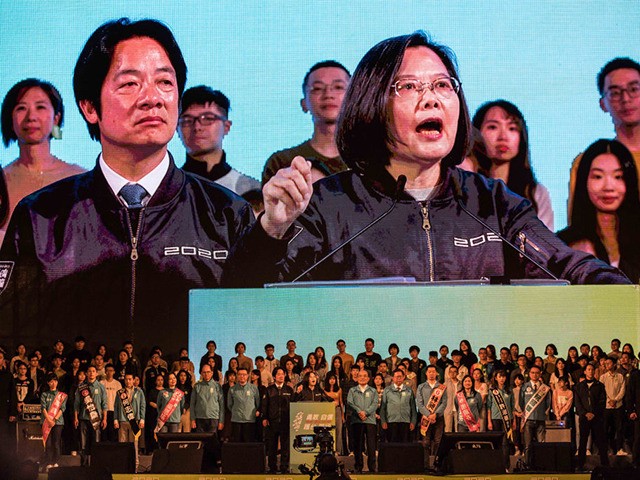Taiwan’s presidential election entered its final day of campaigning with a mixture of angry allegations, calls for unity, and international tensions.
Incumbent President Tsai Ing-wen of the Democratic Progressive Party (DPP) remains heavily favored to win, but Tsai herself advised supporters to “come together and never underestimate our rival,” meaning Kuomintang (KMT) candidate Han Kuo-yu.
The race has been a huge comeback for Tsai and the DPP, which was trounced so badly in the 2018 local elections that Tsai stepped down as leader of the party. The protest movement in Hong Kong is widely credited with shifting the Taiwanese center of political gravity back in her direction as apprehension about China grows. Solid economic growth helped defuse Han’s accusations that Tsai compromised Taiwan’s prosperity by taking a tough stance against Beijing.
“Over the past few years, China’s diplomatic offensives, military coercion, interference and infiltration have continued unabated. China’s objective is clear: To force Taiwan to compromise our sovereignty. Democracy and authoritarianism cannot coexist within the same country. Hong Kong’s people have shown us that ‘One Country, Two Systems’ is absolutely not viable,” Tsai said in her New Year’s Day address to the nation, neatly bottling up her campaign theme.
A huge rally for Tsai on Saturday was brimming with references to Hong Kong, including a profusion of flags emblazoned with the main slogan of the protest movement, “Liberate Hong Kong, Revolution of Our Times.”
Tsai told supporters to “endure to the last minute and achieve electoral victory with unity and love,” reminding them that respected friends and family members might support her opponent.
Such calls for unity are easier for the front-runner to make. KMT’s campaign closed out with angry allegations of corruption against the DPP and warnings of disaster if Tsai retains the presidency.
“We must be united and vote for Han to get rid of the corrupt DPP, to allow Han to build a safe and prosperous Taiwan. If you are an opponent of Tsai but decide not to vote for Han, this means you will be doing Tsai a favor,” said Han’s deputy campaign manager, Chou Hsi-wei.
Understandably, but perhaps not helpfully, former KMT leader James Soong — now running under the People First Party (PFP) in a nominal alliance with KMT — told supporters not to count him out of the race and throw their votes to Han, even though he is running in a very distant third place and Han has little chance of winning if he does not absorb the PFP’s votes.
“Whether you are a KMT supporter or a DPP supporter is not the issue. In line with the basic rules of a democratic society, the most important thing is to elect a capable and honest man to serve us,” Soong said in his own call to unity, choosing words that probably would not go over well in the United States if two male candidates were attempting to unseat a female incumbent.
The saga of confessed Chinese spy William Wang Liquiang boiled through the last day of the campaign, making the calls for unity a bit strained since each Taiwanese party is accusing the other of using Liquiang in a scheme to discredit them. On Thursday, the government of Australia, where Liquiang is seeking asylum, confirmed that an alleged threat to his life is under active investigation.
This prompted DPP politicians to renew allegations that KMT is working with Communist China to influence Taiwanese politics and tried to silence Liquiang through bribery and intimidation. KMT fired back with allegations that the DPP is paying Liquiang to smear them. The DPP said the KMT is bribing Liquiang to falsely state that the DPP tried to bribe him.
Rising tensions between Taiwan’s close ally the United States and Taiwan played a role in the election on Friday, with Tsai taking time to convene a meeting of her national security council and Cabinet ministers to discuss possible impacts on Taiwan’s security, economy, and energy supply. The possibility of China exploiting U.S. distraction in the Middle East to make aggressive moves on Taiwan was discussed.
Another eleventh-hour scandal blossomed on Friday with accusations of homophobia against the KMT and its allies for hanging banners with ostensibly intimidating slogans such as “I Want to Have Grandchildren” and “Continue the Family Line.” LGBT critics denounced the KMT as a “reactionary and conservative force,” while Taiwan’s Green Party and New Power Party (NPP) took the opportunity to boast of their support for same-sex marriage and adoption.
Late polling has Tsai with far more votes than Han and Soong combined, while other parties barely register. Fudan University in the mainland Chinese city of Shanghai published an extensively-researched and carefully-modeled forecast anticipating a blowout win for Tsai with almost 60 percent of the vote on Friday but pulled the prediction down only a few hours later without explanation.
The South China Morning Post noted Fudan University used to be known as a relatively free-thinking institution, but its attitude was adjusted by the Chinese Communist Party last month, so now its charter includes Marxist twaddle and professions of loyalty to the party. The inference was that Fudan was ordered to take down its Taiwanese election predictions because they might depress turnout for the pro-China candidates.

COMMENTS
Please let us know if you're having issues with commenting.